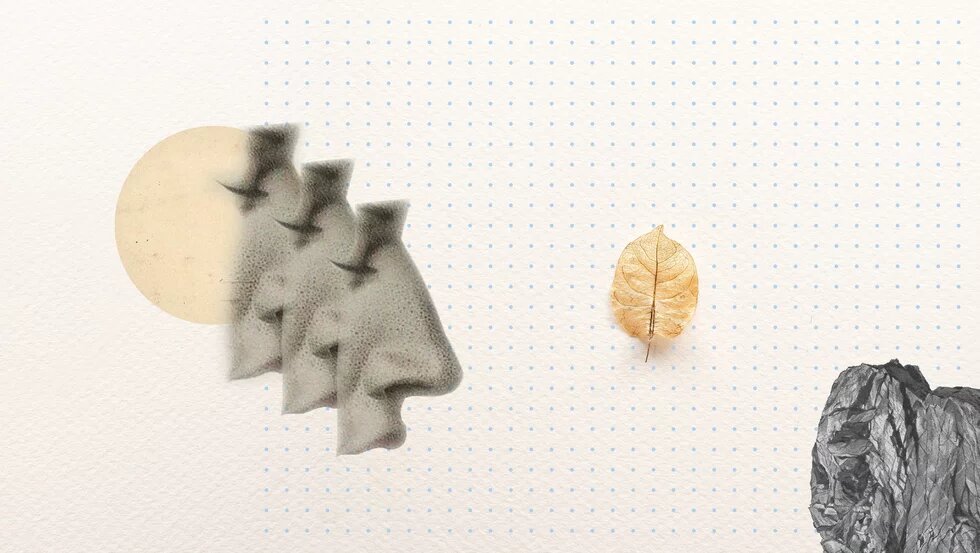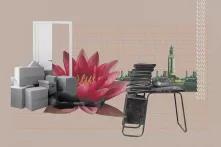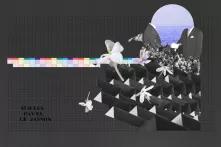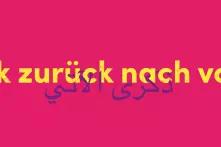On February 10, 2019, Bouteflika announced his fifth presidential candidacy, and six days later protests erupted in Algeria: the Revolution of Smiles. The protagonists of Salah Badis' short story meet in front of a dysfunctional ATM in one of Algiers' richest neighborhoods, and a conversation between strangers unfolds.

I was standing at the cash machine outside the municipal post office in Hydra, surrounded by fellow citizens, all of them in their fifties and sixties, and all of them - all of us - staring at a man whose card had just been swallowed.
“Maybe there’s a problem?” someone from the group ventured. “Maybe there’s no money in the machine?”
The man pointed at the person who had used the machine before him and said that it had swallowed his card too, though neither of them made a mistake when entering their PIN, and neither of their cards were expired.
One of the bystanders began to grumble. He was saying something about “surprise,” that these days the only surprise is when we’re surprised.
The others started to mutter along with him.
My friend and I had been waiting to withdraw cash. The misfortune of the two men ahead of us made up our minds: we wouldn’t risk it. We told the woman behind us in the queue that she could come forward and take our place. She looked to be in a rush, desperate for cash, and had clearly decided to take a chance. The two victims, meanwhile, went into the post office to try and recover their bank cards, now languishing in the steel belly of the machine.
The woman successfully withdrew money, and amid the general astonishment, newly emboldened, we stepped up and withdrew our money too. The grumbling man, waiting for his turn to enter the post office, was still talking.
“Nothing surprises us anymore. I mean, forgive me, but a person should be able to use a cash machine without worrying about whether it’s going to work. How are Algerians meant to have any faith in their bank cards? We might be the only country in the world where a facility like this isn’t up to standard. They say we like to feel the cash in our hands, but that isn’t the case. The problem is that we are unable to put our faith in our institutions: you give your worldly riches to them and they hand you a card with a magnetic strip that is promptly swallowed by a broken machine.”
I went over. He was addressing everyone, but when he saw that I was paying attention he began speaking to me directly. He was tall and elegant, soft-spoken, switching easily between fluent French and formal Arabic, like all bilingual speakers in this country. He had a way of speaking that solicited sympathy: there was a slight catch in his voice, the kind that makes his listener want to give him a hug, to console him. He was wearing a mask, and so was I. No one here wanted to look reckless, like they didn’t care about safety guidelines and social distancing. If it wasn’t for his hair, just a few grey streaks across his head, he would have been the very image of the writer Amine Azzaoui, whose jet-black hair still defies old age.
But who is Azzaoui? Dear reader, Azzaoui is an Algerian writer, “a writer of complaint and discontent” - which is to say, he grieves over the past. He has been writing since the 1980s and must now be in his sixties. He started out writing in Arabic, then switched to French after fleeing the civil war and going to live in France. Later, he returned, and remains active in Algeria to this day. He writes a weekly column, posts copious commentary on Facebook (every post accompanied by an author’s photograph), participates in French- and Arabic-language cultural events, and for the past decade has published novels at the rate of two a year, one in Arabic and one in French.
I first encountered him as a young boy, when he was presenting a radio show about literature and culture, and for all this time Azzaoui has kept up his complaints about the decline of civilized values - urban and urbane - in the face of encroaching Bedouin barbarism. In support of his thesis he cites Ibn Khaldoun and deploys French sentences of great complexity. He has quite lost track of himself in a maze of his own characters and obsessions - sexy aunts, incest, the family legends of Jewish-Muslim families who can trace their lines back to al-Andalus, old manuscripts entombed in the shrines of saints in western Algeria—and is now like a man who has wandered into the desert to collect gemstones and jewels, only to end up, pockets weighed down with stones, without any idea how he will ever get back again, or what he will do with what he’s found.
My friend wandered away to make a phone call. The Azzaoui lookalike was still talking.
“You must excuse me, but you could be my son’s age. Some of us have seen so much in this country.”
He leaned in, closer now than would have been usual even before the pandemic. “We saw Khaled Nezzar return and we didn’t bat an eyelid when they started calling him a hero and cleared him of all charges…”
He straightened up, but his voice stayed low. This was a proper conversation now, the cash machine quite forgotten.
“I live here, in Hydra, ‘home of officials and the wealthy,’ and I know each and every one of them. I see them living their normal lives, not the lives you see on the television.”
My friend finished his call and rejoined us.
“When I see the state of my country today, I despair. What are we missing? What do the advanced nations have that we don’t? I’ve wasted my life here, and when I think back, to 1994, say… How long ago would that be?”
“Twenty-six years,” I say.
“Exactly right. You were probably a little boy. You wouldn’t remember.”
“I don’t, to be honest. That’s the year I was born.”
“Good God. Younger than my own children.”
I said nothing.
“Not that age means a thing!”
“Of course.”
“Anyway, I think it was 1994 that I wasted the opportunity of a lifetime.”
For a moment he fell silent, then: “I got offered a job in Poitiers. You know it?”
I nodded at my friend, and said, “He lived in France, though he’s back now. The only thing I know about Poitiers is that it was the furthest west the Muslims went in Europe.”
“There’s been growing levels of police violence there,” added my friend. “All over France, really. There’s a law they’re trying to get through parliament that would make it an offence to take footage or photos of the police…”
Interrupting my friend’s brief speech on police violence in France, and recovering his temporarily broken flow, the man resumed. “In any case, I was offered work in Poitiers: a job and a home and a car. My children were still young; they could have adapted to life there. Do you know what I said?”
“You said no, and came straight back home?”
“Exactly. I said no and came home, despite the civil war and all the killing. ‘Never,’ I told them. ‘I’ll never live in France. The nayf wouldn’t let me.’”
As he said this last sentence, he touched his nose, hidden beneath his mask.
“I regret it now, of course. How could I leave a life like that and come back here? I regret it.”
“You regret your nayf?” I said quickly.
“What? I regret my naiveté, I’m saying, the patriotism which led me to…”
“But you didn’t say patriotism. You said nayf. They’re different.”
The man smiled. I couldn’t see his whole expression, of course, but I could see it in his eyes.
“Look,” I said. “Nayf is one thing and patriotism is something else. I don’t believe in patriotism and you never mentioned it. You said that you regret your nayf.”
He sounded flustered. “I was young, of course. Maybe I didn’t know what I was saying.”
“But why would you say it at all? Is there something personal between you and France? Some family vendetta? Or was it just that they colonized us?”
“The colonialism, I suppose.”
“And has the history of colonialism somehow changed since? Why the regret? I’ve got no issue with people living in France, but it makes more sense to me that they decide where to live on rational grounds, rather than this colonialism business that clearly isn’t even convincing to you.”
Let me take a moment here to explain what nayf means. It is a word in Algerian dialect. Everyone knows what it means, but they never explain it; or rather, you’ll never find anyone able to define it with any precision. Well, first of all, it comes from anf, the standard Arabic word for nose. We say, “He’s got the nayf,” meaning that someone thinks a lot of himself. In classical dictionaries anafa or unfa is defined as “pride,” and disdainful people are referred to as shumm al anouf, which is to say, “sniffy.”
Now, all these nasal terms derive their meaning from the fact that the nose is one of the highest features on the human body. If water reaches our noses, we drown and we die. It is the highest feature on the face. When we fall, we do all we can to avoid landing on our face so that our nose does not strike the ground. To “rub someone’s nose in it” is to humiliate them. Which is why the man became flustered when I asked if he regretted the nayf that had taken hold of him and made him reject the offer to live in France. It is why he preferred to say that he regretted naive patriotism rather than admit his slip of the tongue.
“I was travelling a lot back then,” he said. “We used to believe that we could change things for the better.”
“What did you do?” asked my friend. “You used to travel a lot; your neighbors are officials and generals. Did you work for the government?”
“Ah.” The man hesitated for a moment, then said, “You could say that, yes. But I wasn’t a government employee exactly. I’m an engineer.”
“Maybe that’s why you feel such despair,” my friend said. “It’s not easy to live next to all this negative energy and remain unaffected.”
Astonishment dawned in the man’s eyes.
“Now,” said my friend, “how does that poem go?
Never serve the Sultan, ever,
Never join his company,
Secure your interests and endeavors,
Take only what God gives to thee…”
There was silence. The man wanted to say something. He apologized for rambling on. He was a good man, despite his endless complaining, so we said, no, quite the contrary, it had been a really interesting conversation, and we wished him the best.
When I got home I called my friend and we talked about the man, about his complaints and his regret at missing the chance to settle in France. My friend said that he had wanted to make the man understand that we were young men, that even though our lives were more insecure, financially and psychologically, than his own had been, we still had hope for our country. My friend said that he himself had left France to return to Algeria because there was no life there, no opportunity.
Later, I went to the website of the Al Maani online dictionary and began searching through the entries for anf, nose. I was looking for any possible connections with the Algerian nayf, but to my surprise - the same surprise that always accompanies any voyage through the classical dictionaries - I found that among the words derived from the root word anf is anifa, which means “to complain.”
Author: Salah Badis is an Algerian writer and translator. He works as a journalist and writes poetry and short stories. His latest publication is „hadhihi al-ashiaa tahduth“ (Short stories; en. „Such things happen“, al-Mutawassit Publishing, 2019)
Translation from Arabic: Robin Moger is a translator of Arabic poetry and prose based in Cape Town, South Africa.
Curation: Sandra Hetzl (* 1980 in Munich) translates literary texts from Arabic, among others by Rasha Abbas, Mohammad Al Attar, Kadhem Khanjar, Bushra al-Maktari, Aref Hamza, Aboud Saeed, Assaf Alassaf and Raif Badawi, and sometimes she writes too. She holds a Masters in Visual Culture Studies from the University of the Arts in Berlin, is the founder of the literary collective 10/11 for contemporary Arabic literature and the mini literature festival Downtown Spandau Medina.
________________________________________________________________________________
This essay is part of our series "Reminiscence of the future". To commemorate ten years of revolution in North Africa and West Asia, the authors share their hopes, dreams, questions and doubts. The essays indicate how important such personal engagement is in developing political alternatives and what has been achieved despite the violent setbacks.
In addition to the series we also address the ongoing struggle against authoritarian regimes, for human dignity and political reforms in various multimedia projects: For example, our digital scroll story "Giving up has no future" presents three activists from Egypt, Tunisia and Syria who show that the revolutions are going on.


